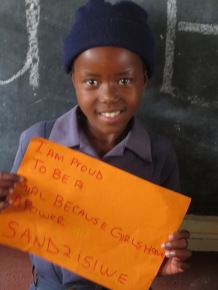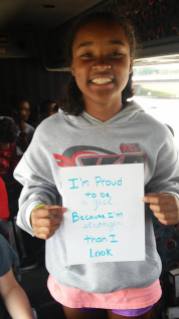“At least we’re late together!”
My khumbi had been late getting to Durban – two bomake had to get off the khumbi after a fight over the ownership of a bag – and my taxi driver kind of understood where I needed to go but not really. I had remembered my passport, so that was good. My ID badge photo was the most photogenic ID photo I’ve ever taken and I assume it was only because I wasn’t paying attention. I was relieved by the presence of other latecomers, and we walked into the volunteer meeting just as all the people stood for whom this was their fourth International AIDS Conference. Some people thought we were also four-year volunteers. N-n-nope, very very new.
Manu, my supervisor, had the hair of a queen, the clothes of an artist, and knew exactly who I was from the description my friends had given her at Cool Runnings the night before. “The hair, sisi. And the walk. The walk like this.” Her hands mimed a pendulum swing. In our group, the volunteers who were running Global Village sessions, there were two other Peace Corps volunteers, including one RPCV in her sixties from South Africa. We chatted about acronyms as we walked down to the Volunteer Center, in the parking lot, where we decided we didn’t want to wait for our t-shirts in the 30-person long line – in the end, a mistake, as no one ever orders enough size smalls.
The International AIDS Conference is the biggest international conference on HIV/AIDS, and the faces of AIDS around the world are multitudinous. The conference itself centered on panel discussions, the presentations of research papers, and posters, while the Global Village – open to the public – was a more boisterous gathering of international and local NGOs, art, music, even a yoga class, and the (much nicer) Exhibition center next door had booths from pharmaceutical companies, bigger NGOs and research institutions (Tom from the London School of Hygiene was a giggler) and groups like the International AIDS Society, MSF, and some Korean condom company with condoms that glowed in the dark. There was a photography exhibition on aging and AIDS. There was another on the different faces of AIDS around the world; not only how they’re seen by an outside camera, but they were given a camera themselves and asked to show their own world.

The main stage in the Global Village was hosting musicians, performance artists, actors, and a daily yoga class at 8 and 12. I also happened to stumble upon Elton John there while going to clock out — casual — but the Condomize campaign, next to the main stage, refused to be cowed by Scheduled Activities and played its music ever louder. Theirs was one of the most colorful booths, replete with full-size condom costumes, semi-temporary tattoos, a photo booth, and an Instagram station.
Every day was different, exhausting, fueled by coffee from the vouchers we got at the beginning of each shift and flatbread pizza from the packed stand near the DREAMS booth. Sometimes there was free popcorn. Sometimes there were free orange slushies. I became adept at attending the sessions that served bagged lunches, and on the second to last day we discovered the hot plate finger food near the escalators, if you were there til after 6. I went to big sessions in arenas as big as my college basketball court, to watch Bill Gates and Elton John and Prince Harry speak on giant screens; I nervously balled my notes together between my palms while waiting to ask a panelist a question on how to encourage girls to look beyond pregnancy to work, if there was no work to be had in their communities (her answer was unsatisfying). I learned that India has one of the best transgender welfare systems, in large part because third genders are a part of their culture. I was given a movie called No Boundaries, a documentary from Nigeria about people living with disabilities. And one of my favorite sessions, on the final day — a forum for youth activists across Africa to talk about creating a continental network of youth activism, about how to change minds & hearts, and how to use our voices and our skills to bring attention to the youth of Africa. I took a lot of pictures that day, but my favorite was the one taken at the end of that session, for which I stayed far beyond the end of my shift, where the energy was palpable & there was hope.

I was ready to be inspired by this conference, and I often was — but there was less hope than I expected. The worldwide HIV incidence rate has stagnated, as has the funding for new AIDS research. Bill Gates talked about exciting developments towards an AIDS vaccine, a treatment that could be administered once every few months and would improve adherence rates — but he also discussed the need for double the money, for the prototype and the finished product. AIDS isn’t sexy on the world stage anymore, in part because treatment and adherence are so tricky to standardize. Every intervention has to be tailored to the community it’s in; there are no blanket solutions. Many of the sessions tended to be reiterations of problems that we already know, instead of discussion of possible solutions or paths forward. And there seemed to be a disconnect, in some places huge, between the researchers and their subjects, in a way that, as a Peace Corps volunteer, often seems almost unethical. At the grassroots level, these numbers are humans with problems that keep them from adhering or addictions they can’t overcome or financial problems that obligate them to sleep with a “blesser” (sugar daddy) for school fees. At the top level, it seems like these women and sex workers and transgender people and drug users are all tarred with the same brush, making them a mass statistic that can often seem beyond help.
The key populations that the rest of the world focuses on, too, are not those that we see in Swaziland. In most of the world, the most vulnerable populations are female sex workers (FSW), men who have sex with men (MSM), intravenous drug users, and LGBTQI community, partly because these groups are already highly stigmatized anyway, and partly because they’re prone to more high-risk behaviors. These populations don’t loom large in traditional Swazi society. But perhaps more depressingly, the key population in Swaziland is half of the population — women & girls, who are at high risk for HIV infection just by the nature of how their gender is treated in Swazi society. We have to deal with this fact every day, particularly in GLOW. But it’s hard to think about for too long. And few of the papers in the conference dwelt on the plight of women and girls in societies like Swaziland.
Nevertheless, every day I left the conference and had spirited conversations with my fellow volunteers about the sessions we’d attended that day. Ah we of the yellow shirts — my hostel was full of delegates and volunteers, from Tokyo to Singapore to Ireland to Canada, we shared stories over Windhoek drafts and took advantage of the Tinder Tuesday deals at Taco Zulu and learned from each other and danced with each other, enjoying that though the work we’re focusing on is often painful and sad, and that the statistics on the screens named by carefully-dressed researchers with Swiss accents are the people that we live among, there are many people who are trying to make those things a little bit better. It helps to not feel so alone when facing a tide so high.
Durban by the sea, Durban in the sun, Durban glittering over the ocean at night — I spent my days working and learning about something I love, and I spent my nights soaking in the feeling of being home again, or close enough. I spent the weekend before the conference with friends, and we could dress like ourselves again — we shared poached pear salad & pesto gnocchi & we danced for ten hours to old school hip hop — we made friends with photographers and skaters and traded bracelets with strangers. I breathed easier. I always do.
The next AIDS conference is in 2018 in Amsterdam, and if I end up where I hope, I’ll make my second volunteer appearance. I don’t know how it could compare to South Africa though, where two blocks from the conference starts the hint of a township; where many of the volunteers themselves announced their positive status; where the importance and immediacy of the work done in the conference is evident as soon as you walk out the door.
In the quote my interview with a French journalist, who referred to me as “la petite rousse Emily” — it was amazing to be there, and amazing to participate.

![IMG_20151128_094151061_HDR[1] IMG_20151128_094151061_HDR[1]](https://uneprecieusevie.files.wordpress.com/2015/12/img_20151128_094151061_hdr1.jpg?w=401&resize=401%2C226&h=226#038;h=226)
![IMG_20151128_103851883_HDR[1] IMG_20151128_103851883_HDR[1]](https://uneprecieusevie.files.wordpress.com/2015/12/img_20151128_103851883_hdr1.jpg?w=401&resize=401%2C225&h=225#038;h=225)
![IMG_20151128_103858968_HDR[1] IMG_20151128_103858968_HDR[1]](https://uneprecieusevie.files.wordpress.com/2015/12/img_20151128_103858968_hdr1.jpg?w=256&resize=256%2C455&h=455#038;h=455)
![IMG_20151202_134635915[1]](https://uneprecieusevie.files.wordpress.com/2015/12/img_20151202_1346359151.jpg?w=665&h=374)
























